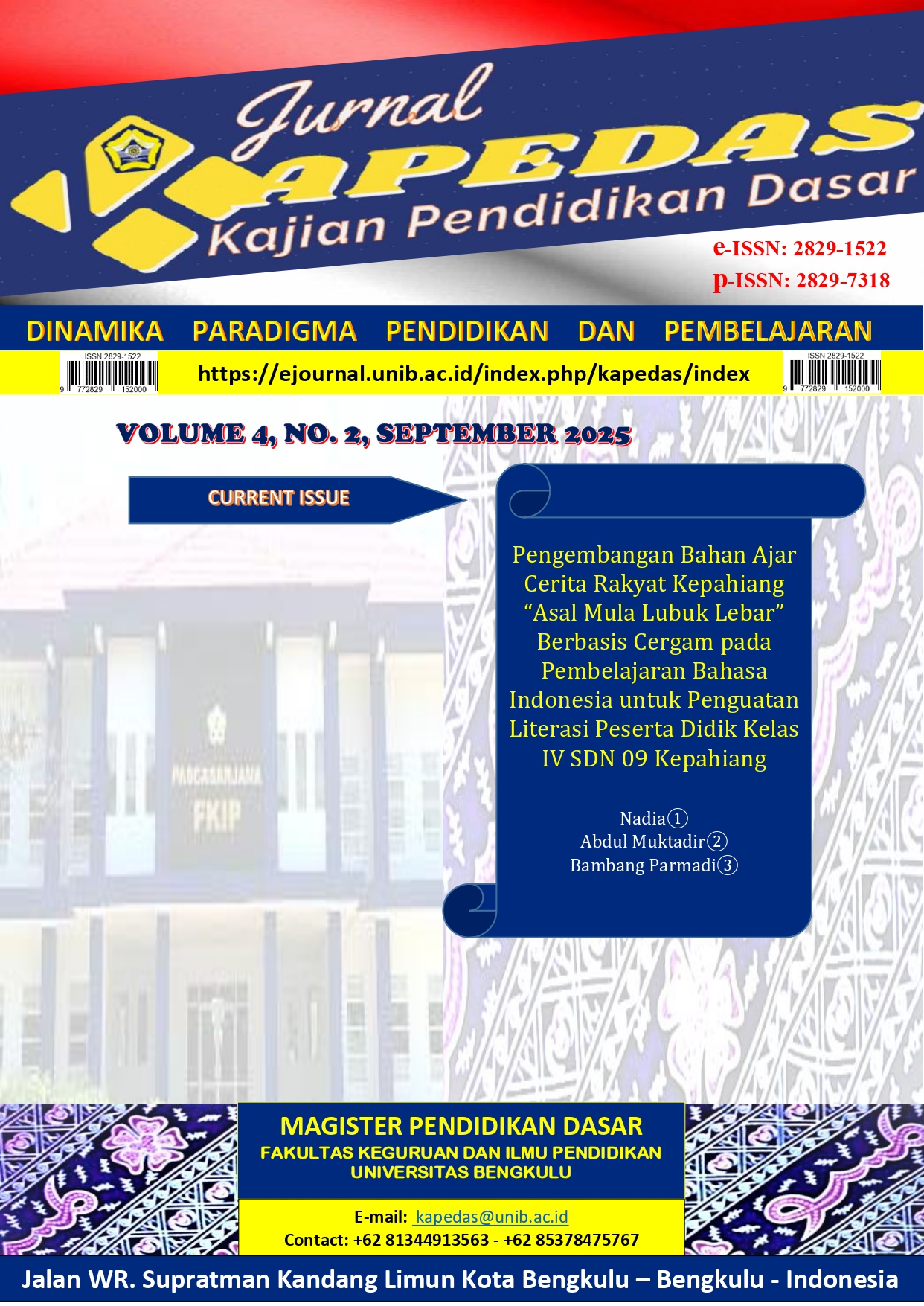Main Article Content
Abstract
The purpose of this study is to develop science student worksheets (LKPD) based on the cooperative Group Investigation model on the topic of states of matter and their changes in order to enhance students’ cognitive learning outcomes. This study employed a Research and Development (R&D) approach using the ADDIE development model. The data used in this study comprised both quantitative and qualitative data. Quantitative data were obtained through rating scale questionnaires completed by expert validators, while qualitative data were gathered from the validators' comments and suggestions. The research results indicate that the characteristics of the science LKPD based on the cooperative Group Investigation model include the core elements of the model, namely grouping, planning, investigation, organizing, presenting, and evaluation. The feasibility of the LKPD was determined through expert validation, with the material expert assigning a score of 1.00, the language expert a score of 0.94, and the design expert a score of 0.91. Student responses indicated a high level of user satisfaction, with a percentage of 96%. The average pretest score was 64.04, while the posttest average increased to 90.04. The N-Gain test for cognitive learning outcomes showed a score of 0.722, which falls into the high category.
Keywords
Article Details
Copyright (c) 2025 Surya Widia Lestari, Endang Widi Winarni, Abdul Muktadir

This work is licensed under a Creative Commons Attribution-ShareAlike 4.0 International License.

Karya ini dilisensikan di bawah Creative Commons Attribution-ShareAlike 4.0 International License .
References
- Arends, R I. (2012). Learning to Teach ninth edition. New York : McGraw-Hill.
- Bruner, J. (1966). Towards a Theory of Instruction. Cambridge, MA: Harvard University Press.
- Fitriyati, I. (2017). Pengembangan Perangkat Pembelajaran IPA Untuk Meningkatkan Kemampuan Berpikir Tingkat Tinggi dan Penalaran Ilmiah Siswa Sekolah Dasar. Jurnal Pembelajaran Sains, 1(1), 27–34.
- Khoirurrijal, Fadriati, Sofia, & Dkk. (2022). Pengembangan Kurikulum Merdeka. In R. Aqli (Ed.), CV. Literasi Nusantara Abadi (Cetakan I).
- Marinda, L. (2020). Teori Perkembangan Kognitif Jean Piaget Dan Problematikanya Pada Anak Usia Sekolah Dasar. An-Nisa’ : Jurnal Kajian Perempuan Dan Keislaman, https://doi.org/10.35719/annisa.v13i1.26
- Mayasari, D., Meirista, E., & Jayanti, D. P. (2021). Pengembangan LKS Pada Materi Limit Menggunakan Model Pembelajaran Group Investigation Berbasis Komunikasi Matematis. Musamus Journal of Mathematics Education, 3(2), 57–67. https://doi.org/10.35724/mjme.v3i2.3571
- Nirmayani, L. H. (2022). Kegunaan Aplikasi Liveworksheet Sebagai LKPD Interaktif Bagi Guru-Guru SD di Masa Pembelajaran Daring Pandemi Covid 19. Edukasi: Jurnal Pendidikan https://doi.org/10.55115/edukasi.v3i1.2295 Da
- Prastowo, A. (2015). Panduan Kreatif Membuat Bahan Ajar Inovatif. Diva Press.
- Simamora, A. B., Panjaitan, M. B., Manalu, A., & Simanjuntak, I. D. . (n.d.). Model Pembelajaran Kooperatif.
- Siregar, N. S., Julianto, A., & Ismunandar, A. (2022). Dampak Perubahan Kurikulum terhadap Buku Paket Bahasa Indonesia sebagai Kebijakan Pendidikan. Jurnal Pendidikan Islam Al-Affan, 3(1), 1–11. http://ejournal.stit alquraniyah.ac.id/index.php/jpia/
- Sulistyanto, H. (2008). Penerapan Sains Teknologi Masyarakat Dalam Pembelajaran Sainis di SD. Depdiknas Dirjen Dikti Direktorat Ketenagaan, 16–52.
- Trianto. (2010). Model Pembelajaran Terpadu, Konsep, Strategi, dan Implementasinya dalam KTSP. Jakarta: Bumi Aksara.
- Vygotsky. L.S. (1978).Mind in Society: The Development of Higher Psychological Processes. Cambridge, MA: Harvard University Press.
References
Arends, R I. (2012). Learning to Teach ninth edition. New York : McGraw-Hill.
Bruner, J. (1966). Towards a Theory of Instruction. Cambridge, MA: Harvard University Press.
Fitriyati, I. (2017). Pengembangan Perangkat Pembelajaran IPA Untuk Meningkatkan Kemampuan Berpikir Tingkat Tinggi dan Penalaran Ilmiah Siswa Sekolah Dasar. Jurnal Pembelajaran Sains, 1(1), 27–34.
Khoirurrijal, Fadriati, Sofia, & Dkk. (2022). Pengembangan Kurikulum Merdeka. In R. Aqli (Ed.), CV. Literasi Nusantara Abadi (Cetakan I).
Marinda, L. (2020). Teori Perkembangan Kognitif Jean Piaget Dan Problematikanya Pada Anak Usia Sekolah Dasar. An-Nisa’ : Jurnal Kajian Perempuan Dan Keislaman, https://doi.org/10.35719/annisa.v13i1.26
Mayasari, D., Meirista, E., & Jayanti, D. P. (2021). Pengembangan LKS Pada Materi Limit Menggunakan Model Pembelajaran Group Investigation Berbasis Komunikasi Matematis. Musamus Journal of Mathematics Education, 3(2), 57–67. https://doi.org/10.35724/mjme.v3i2.3571
Nirmayani, L. H. (2022). Kegunaan Aplikasi Liveworksheet Sebagai LKPD Interaktif Bagi Guru-Guru SD di Masa Pembelajaran Daring Pandemi Covid 19. Edukasi: Jurnal Pendidikan https://doi.org/10.55115/edukasi.v3i1.2295 Da
Prastowo, A. (2015). Panduan Kreatif Membuat Bahan Ajar Inovatif. Diva Press.
Simamora, A. B., Panjaitan, M. B., Manalu, A., & Simanjuntak, I. D. . (n.d.). Model Pembelajaran Kooperatif.
Siregar, N. S., Julianto, A., & Ismunandar, A. (2022). Dampak Perubahan Kurikulum terhadap Buku Paket Bahasa Indonesia sebagai Kebijakan Pendidikan. Jurnal Pendidikan Islam Al-Affan, 3(1), 1–11. http://ejournal.stit alquraniyah.ac.id/index.php/jpia/
Sulistyanto, H. (2008). Penerapan Sains Teknologi Masyarakat Dalam Pembelajaran Sainis di SD. Depdiknas Dirjen Dikti Direktorat Ketenagaan, 16–52.
Trianto. (2010). Model Pembelajaran Terpadu, Konsep, Strategi, dan Implementasinya dalam KTSP. Jakarta: Bumi Aksara.
Vygotsky. L.S. (1978).Mind in Society: The Development of Higher Psychological Processes. Cambridge, MA: Harvard University Press.
